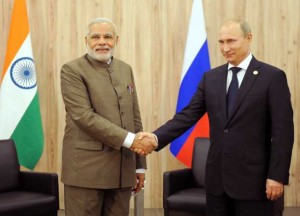 Nuclear cooperation, including for a “cascade” of nuclear reactors, would be high on the agenda of talks between Prime Minister Narendra Modi and Russian President Vladimir Putin during their summit meeting here next week.
Nuclear cooperation, including for a “cascade” of nuclear reactors, would be high on the agenda of talks between Prime Minister Narendra Modi and Russian President Vladimir Putin during their summit meeting here next week.
Russian Ambassador Alexander M. Kadakin, addressing a press briefing ahead of Putin’s New Delhi visit on Dec 11, also reassured India that a Russia-Pakistan framework agreement inked recently was only for civilian choppers to Pakistan and that “Russia will never do anything to the detriment” of ties with India.
Around 20 agreements are to be inked during the 15th Annual India-Russia Summit between Putin and Modi here.
Kadakin said Putin’s visit would “provide a powerful recharge to the whole gamut of bilateral relations” and broaden the spectrum of the mutually beneficial partnership, “which is gaining new substance”.
On the nuclear talks, the envoy said the issue will figure prominently in the talks and a “serious document” on building a nuclear roadmap is expected to be inked.
Kadakin said Russia has agreed to build around 16 nuclear units but India has demanded “a much bigger” number of 24 units.
“We are not thinking of numbers, but have to work in concrete time frame,” he added.
On the Kudankulam Nuclear Power Project in Tamil Nadu, being built under a joint Russian-Indian project, the envoy said the first unit is working and a technical glitch in it is being corrected.
The second reactor is at a “degree of readiness” and everything was according to schedule and it would commence trial stage in March next year. Kudankulam-II is being built by the Russian state nuclear firm Rosatom with Nuclear Power Corporation of India Limited (NPCIL).
On Kudankulam III and IV units, he said Russia has opened credit lines and “some documents may be signed, while negotiations would start on Units 5 and 6 soon”.
Besides, India and Russia are set to agree on a “cascade of nuclear units” and Moscow is awaiting the naming of the areas where they would be build.
“Nuclear cooperation is item number one on the agenda” of the bilateral talks, the ambassador said.
To a question on price escalation of the nuclear reactors, he said that there has been price escalation everywhere, including in India.
Russia would also offer India more fields to scout for hydrocarbons. India’s ONGC Videsh Ltd. is already scouting oil in the Sakhalin-1 field.
“We are ready to offer India other mines and fields for hydrocarbons,” the envoy said. OVL is likely to acquire stakes in the Vankor and Yurubcheno-Tokhomskoye fields in Siberia, according to reports.
On the Russia-Pakistan military cooperation agreement, the envoy said that “India must rest reassured that India is a strategic partner and the closest friend of Russia, and Russia will never ever do anything to the detriment of relations with India”.
Defence cooperation talks would also figure prominently, including on the fifth generation fighter aircraft, which he said both sides were working on quietly and the planes are likely to roll out in 2018-19.
On the problem of Russian spares, the envoy said Russia was looking to setting up service centres in India for its weapons. This would prevent India from purchasing “counterfeit spares from counterfeit suppliers” like Israel, referring to the Russian-built MiGs that have seen a series of crashes.
On economic cooperation, Kadakin said India is in advanced stage of negotiations to join the Russia-led Eurasian Economic Union. Bilateral economic cooperation, which stands at $10 billion, he said, was low and needed to be corrected.
Putin is arriving with a 15-member strong team of business honchos and his visit would see talks between the Russian businesspersons and Indian corporate leaders, including Reliance and L & T.
To a question on US President Barack Obama being invited to be the chief guest at the Republic Day parade next year, Kadakin said that Russia does “not feel jealous” of India-US ties.